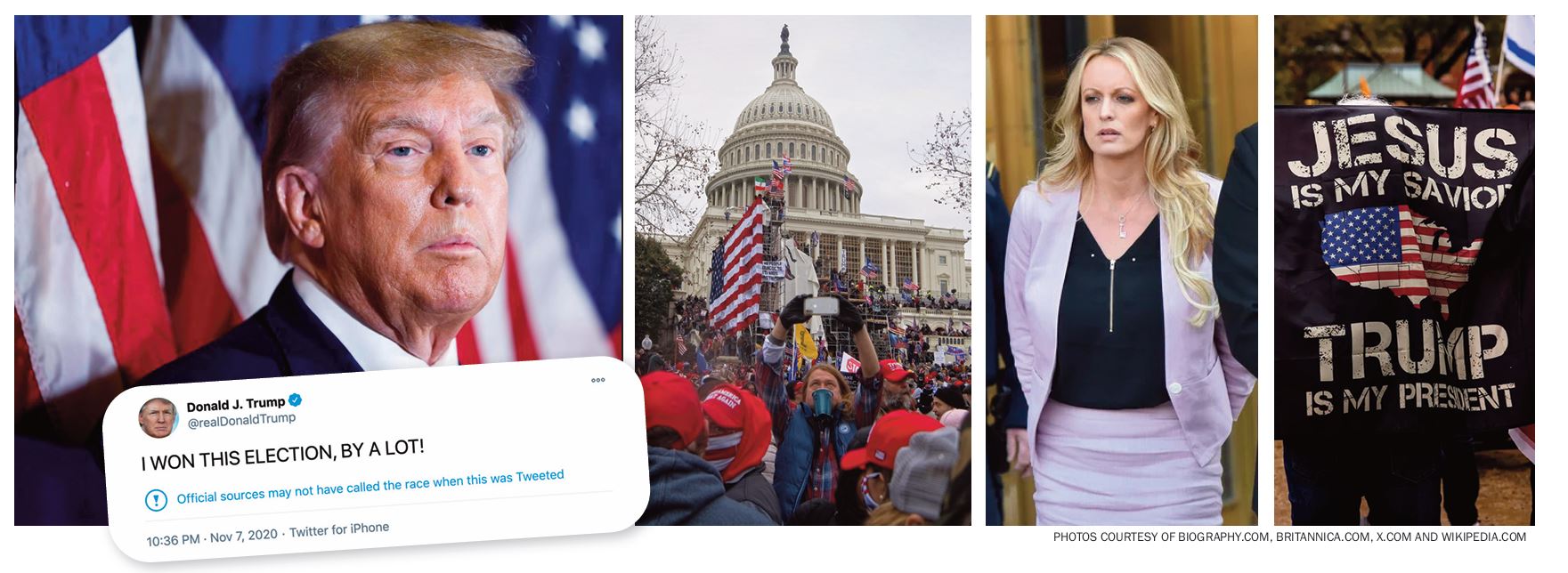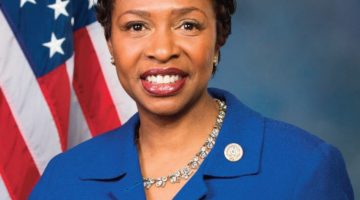From left, Donald Trump, scene outside US Capitol during the Jan. 6, 2021 attack, the Stormy Daniels “Hush Money” trial, Christian nationalist. PHOTOS COURTESY OF BIOGRAPHY.COM, BRITANNICA.COM, X.COM AND WIKIPEDIA.COM
Donald Trump has made history as the first American president who is a convicted felon. But his enduring legacy will be that he enabled fundamentalist Christianity to become a potent force in American politics that will endure.
As this column reported previously, Anne Nelson, in her 2019 book “Shadow Network,” noted that several fundamentalist leaders and their affiliated organizations, especially the Council for National Policy (CNP), helped promote Trump’s candidacy in the 2016 election. The CNP was founded in 1982 “by a small group of arch-conservatives who realized that the tides of history had turned against them,” Nelson wrote. “They represented an American past dominated by white Protestant male property owners. They dreamed of restoring a 19th century patriarchy that
limited the civil rights of women, minorities, immigrants and workers, with no income tax to vex the rich or social safety net to aid the poor. Now they faced a future in which minorities, women, gays and atheists were gaining in number, rights and political influence.”
Leaders of the CNP, which emerged from the Southern Baptist Convention’s “Conservative Resurgence” in the early 1970s and early 1980s, realized that the democratic process would enable those
groups to change the balance of political power. They devised a “long-range strategy to target critical districts and activate previously unengaged voting blocs.” Needing a political vehicle, they chose the Republican Party and conducted “a decades-long crusade to promote right-wing extremists and drive moderates out of office.”
The fundamentalism arose from American Protestantism whose “most conservative bastions held fast to the notion of God-given exceptionalism – the United States as the ‘City upon a Hill.’” Significantly, that perspective is “not much different from how white supremacists see America’s future” which is “the loss of white identity in the growth of minority population,” Nelson wrote.
But it was not all smooth sailing. Tensions arose within the movement, coming to a head in the late 1960s and splitting the Southern Baptist Convention over “a belief in authoritarian principles, linking ‘biblical inerrancy’ to theocracy.” That belief “extended to the tenet of strict constructionism which upheld a literal interpretation of the Constitution and other laws, restricting their meaning to their supposed intent at the time they were written.”
The leaders of that faction “learned how to achieve minority rule through long-term strategies which they would soon apply to the country as a whole, manipulating the electoral process and reshaping the judiciary.” Their efforts resulted in “astonishing success.”
A sense of urgency arose in the 1960s when Southern society, based on segregation, was rocked by a number of developments. Those included the Supreme Court’s ruling in favor of interracial marriage and the appointment of the first African American, Thurgood Marshall, to the court. “Even the Bible was under scrutiny as a new generation of theologians reviewed the scientific record and suggested that the Good Book was a profound work of literature, not a chronicle of historical fact,” Nelson wrote.
Such developments strengthened the determination of the fundamentalist wing of the Baptist movement to work towards transforming the United States into a Christian nation.
Fast forward to the 2016 presidential campaign. Nelson listed Ralph Reed, founder of the Faith and Freedom Coalition, among those who success- fully promoted Trump’s candidacy to initially skeptic fundamental leaders. But Trump’s entry into “the world of rightwing evangelicalism” was facilitated by Paula White-Cain, a Floridabased prosperity preacher and a close spiritual adviser, Chris Lehman reported in The Nation’s April issue.
“Leaders such as Southern Baptists Jerry Falwell, Billy Graham and Pat Robertson had long presided over king-making political operations like the Moral Majority and the Christian Coalition. But with White-Cain directing evangelical outreach for Trump, the team’s coterie of spiritual insiders was now made up of fellow charismatics,” Lehman wrote, adding, “Much like the partisans of the nascent Trump movement, these religious innovators understood that a deeply anti-institutional, personality-driven approach was the path forward.”
The New Apostolic Reformation (NAR) and prophet and strategist Lance Wallnau also played a key role. Wallnau had written a 2013 tract, “Invading Babylon,” in which he cited the “Seven Mountain Mandate,” a blueprint “for unrivaled control over the nation’s future” centering on politics, education, the media, the family, business, entertainment and the church.
NAR, Lehman wrote, “organized itself into cadres of worldly minded prophets in the Wallnau mold” to “short-circuit the old model of evangelical political influence in favor of a proposal to annex the national government, together with other leading cultural and civic institution, as part of a mission to revive the American Christian nation.”
Wallnau proclaimed Trump, in Lehman’s words, “a direct spiritual heir to the ancient Persian King Cyrus, a pagan world leader who won God’s favor by allowing the Jews exiled in Babylon to return to the promised land and rebuild the Temple. The prophet who laid out the battle plan to invade modern Babylon now understood that heretofore secular GOP presidential hopeful would, with God’s sanction, reclaim the citadels of worldly power on Christianity’s behalf.”
Lehman continued, “Under the dual influence of Trump and charismatic prophets in the NAR vein, rightwing evangelicals have shed past shows of diffidence about race and authoritarian extremism and began to broker full spiritual communion with these ugly forces.” They embrace the “14 words” which are “at the core of replacement theory racist doctrine.” The 14 words are: “We must secure the existence of our people and the future of white children.”
With Trump winning in 2016, those forces gained unparalleled access to the highest levels of power. But then came 2020 and they were confident he would win re-election. The message was hammered home in various ways, including, as Matthew D. Taylor, senior scholar at the Institute for Islamic, Christian and Jewish Studies, told Lehman, the creation of FlashPoint, a prophecy-themed current-events TV show distributed by the Victory Channel run by Kenneth Copeland, a rightwing prosperity televangelist. In September 2020, it received 50,000 YouTube views, increasing to more than 32 million in January 2021.
So, when Trump lost, his followers were already primed to believe his claim of electoral fraud and ready to join “Jericho Marches” in Washington, D.C., and swing state capitals “to castigate the victorious Biden coalition in the starkest prophetic rhetoric, identifying the Democratic opposition as Satan’s minions.” God’s chosen leader and his followers now had their Babylon to invade. And the prophets were saying, according to Taylor, that “God is going to have to intervene because we’re not backing off Donald Trump. God will miraculously intercede.”
There was no divine intervention but there was a violent storming of the U.SD. Capitol.
“This notion that Jan. 6 was a Trump thing – no, it was a religion thing, a mishmash of religious believers who have coalesced around Trump. The religious test now is: How close are you to God?” Anthea Butler of the University of Pennsylvania told Lehman.
“The religious mobilization behind Trump’s post-election coup attempt is perhaps one of the least reported major political stories of our time,” Lehman wrote. He credits it to the efforts of then Wyoming Rep. Liz Cheney, who co-chaired the House Select Committee investigating the coup attempt, “to downplay the role of religious figures and ideas.”
Jeff Sharlet, author of “The Undertow,” told Lehman that “fissures” had opened up in the Trump camp, especially involving Vice President Mike Pence, who refused his request to reject the election results in Congress. Pence, Sharlet said, “was sold to Trump as the transaction that would nail down the evangelicals, but what he didn’t understand was that he was a booster rocket for the merger of MAGA and the evangelicals.”
However, Sharlet said, “That merger has happened now, and this is the thing where I’ve been saying I was wrong: I used to think full-fledged fascism wasn’t possible in the United States, precisely because of Jesus.”
Commented Lehman, “What began as a faux-populist appeal to rescue an imperiled, mythic ‘real America’ is now a full-fledged political revival movement, replete with personal redemption narratives, baptisms, and a new spiritual argot, steeped in the absolutist rhetoric and disposable memes of the Internet.”
As Lehman and others have noted, and to borrow from Gil Scott-Heron’s 1970 poem of another era, that revolution is not being televised. But it is live and ongoing.













No Comment